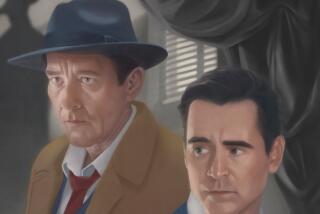Book review: ‘Faithful Place’ by Tana French
At the heart of Tana French’s third crime novel, “Faithful Place,” lies a tragic misunderstanding. For 22 years, Frank Mackey of the Dublin Undercover Squad (who appeared in French’s previous novel, “The Likeness”) has defined himself by the loss of his first love, Rosie Daly, who ditched him — and was never seen or heard from again — on the night they were to elope to England. One moldy suitcase found behind the fireplace of a derelict house derails a lifetime’s assumption. Inside the suitcase: shreds of clothes, two long-expired ferry tickets to London and Rosie’s birth certificate.
“I had spent my whole adult life growing around a scar shaped like Rosie Daly’s absence,” Frank observes. After waiting all night for Rosie, he had taken the ferry alone. When he returned to Dublin years later, he kept his distance from his brawling family in the Liberties (the inner city), who he was sure had driven his beloved away. Now he has to revise that story, go home at last and find a killer.
“Faithful Place” is not a page-turner but a page-lingerer: French gives us a clear-eyed portrait of the Liberties as seen through a murder. In the absence of almost all physical evidence, Frank has to reconstruct the winter night of Rosie’s disappearance through his knowledge of the people he grew up with and the rules they live by. He has the key, even if it’s rusty from disuse and most of the locks have been changed.
Undercover work hangs on a thousand lies: not only the detective’s identity but also his opinions and impulses, the sense of awareness or trust he projects. For all his practice misrepresenting himself, Frank can’t fool his brother Shay, who still hates Frank for escaping to London and leaving him to shoulder the family burdens alone. One night Frank gets drunk with his siblings and pretends to spill confidential details of the case:
“Shay was wearing a thousand-watt skeptical stare, but the other three were right with me, nodding away, proud as Punch: our Francis, after all these years still a Liberties boy first and a cop second, sure aren’t we all great to be such a close-knit bunch. That was what the girls would pass on to the rest of the neighborhood, as the sauce to go with my little nuggets of tasty info: Francis is on our side.”
Conflicted loyalties run in both directions, of course. Shut out of the police investigation because of his connections to the case, Frank, true to the genre, works behind the scenes, making enemies among his fellow detectives and risking his job.
Along with her riveting depiction of place, French has a gift for dialogue so genuine that you can hear her characters breathe. This goes beyond dialect — although lovers of “local Dublin” will get their fix here — to a pure pleasure in wordplay and banter. Frank’s brother Kevin, asked about his crush on a neighbor girl, recalls, “We used to meet in her back garden at night, so she could stop me putting my hand up her top.”
Although tension builds as Frank gets closer to the truth, suspense is not the point. French, whose acclaimed 2007 debut “In the Woods” also dealt with a long-ago mystery that shaped a Dublin murder detective, doesn’t trade in contrived plot twists or cliffhangers. Readers are subjected to just one red herring — although it’s a fat, meaningful one that forces Frank to confront what he has avoided for 22 years.
In a recent interview, French said she thought the Irish gift for storytelling had to do with the native language being forbidden under British rule: “I think that might make a society very intensely aware of the weight of a language: how precious it is, how powerful, how charged and how dangerous.” This sensibility works beautifully in “Faithful Place,” in which accidents of phrasing carry more investigative weight than an autopsy. Take this book slowly and savor the details. Like a slow pour of Guinness, it’s worth the wait.
Marler is the editor of “Queer Beats: How the Beats Turned America on to Sex.”
More to Read
The biggest entertainment stories
Get our big stories about Hollywood, film, television, music, arts, culture and more right in your inbox as soon as they publish.
You may occasionally receive promotional content from the Los Angeles Times.










